Puccini: The Early Years
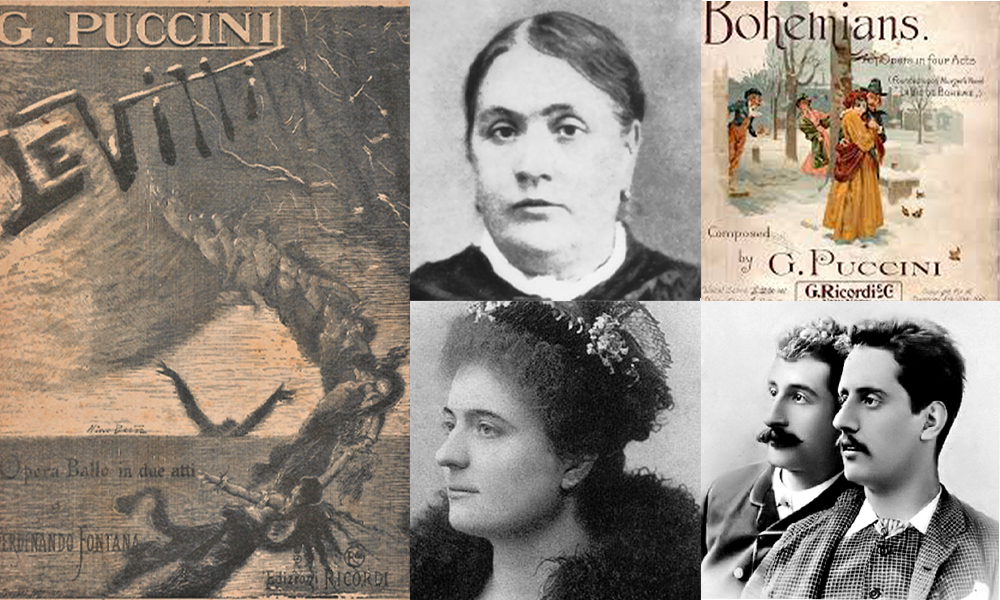
Listen and Read Along
This article is read by an automated voice
Giacomo Puccini was born in 1858 in Lucca, Italy. He was the sixth of nine children and the first son in a family considered Lucca's musical dynasty. For over 172 years, the Puccinis served as the town's musical custodians, with each generation occupying the prestigious post of maestro di cappella. The family legacy was meant to be Puccini's inheritance, but destiny had other plans. In 1863, at just five years old, Puccini lost his first companion, his father, Michele. The family's once-stable world plunged into financial insecurity, a struggle magnified by the broader social and economic unrest of a newly unified but fractured Italy.
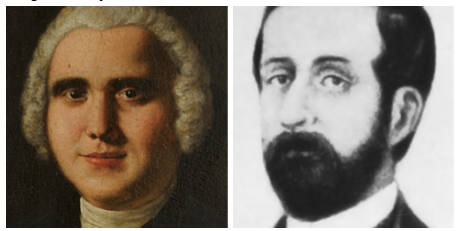
1. Giacomo Puccini Senior / Puccini Museum 2. Michele Puccini / Puccini Museum
The family's survival fell on the shoulders of the matriarch, Albina Magi. Puccini's mother was strong in faith and commitment; she not only became the family's provider, she was the center of Puccini's world and his staunchest advocate. Albina arranged for him to study music under his uncle, Fortunato Magi, who dismissed the boy, saying that his nephew "lacked talent and was not a very diligent student." But Albina never lost faith. Drawing on the family's musical heritage, she secured a stipend from the church and ensured Puccini's education in seminaries, preparing him to take his father's position as maestro di cappella when he came of age.
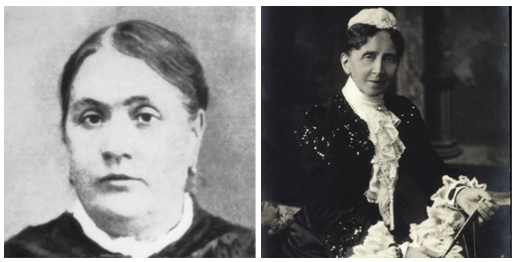
1. Albina Puccini / Agi Museo Di Celledei 2. Albina Puccini / UG-Brigeman Images
Everything changed for him at 15 when he experienced Giuseppe Verdi's Aida (1873) in Pisa. The grandeur of opera struck him with such force that he described it in a letter as "a musical window that had opened," shifting his focus from sacred music to opera.
Albina continued to support her son and obtained a scholarship for him at the Milan Conservatory. Puccini composed The Messa di Gloria for his graduation project at the Cathedral of San Martino in Lucca. This work solidified the family's generational connection to the church and celebrated Albina's unwavering devotion.
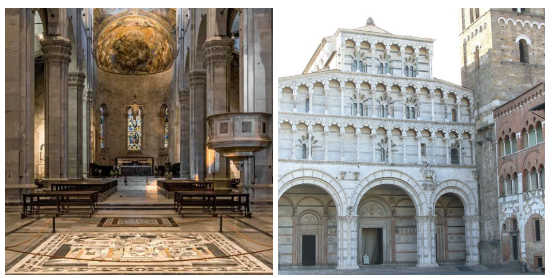
1. Interior of the Cathedral of San Martino, Lucca / Andrea Vierucci 2. Exterior / italian-traditions.com
Italy After Unification: A Nation Divided
Although Italy's unification in 1861 was a diplomatic achievement, it ultimately failed to address social issues. Puccini grew up in this new nation, where the wealthy became increasingly affluent while the middle class and the poor fell into poverty. The country's cities struggled with hunger, disease, and a wave of immigration. While Puccini was studying in Milan, he saw these hardships up close. Letters from his student years reveal desperation: "I am terribly hard up. I don't know how I can go on." While many of his friends and neighbors were migrating out of Italy, Puccini would never consider leaving his mother. This sense of poverty and struggle later became a theme of La Bohème. Although set in Paris, the world of starving artists, cold tenements, and fleeting happiness reflects the disillusioned youth born into a young Italy. The destitution of Rodolfo and his friends is not just romantic suffering; it mirrors the extreme poverty Puccini and his generation knew all too well.
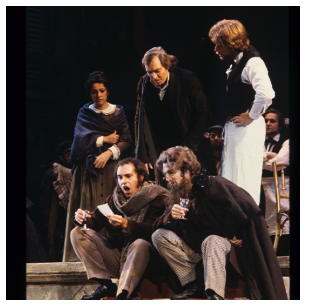
La Bohème (1978) / Ron Sherl_San Francisco Opera
Puccini made ends meet by giving piano lessons and submitting work to music competitions. His first stage work, La Ville, was initially submitted to a Casa Musicale Sonzogno opera competition with librettist Ferdinando Fontana. Puccini's Milan Conservatory composition teacher, Ponchielli, introduced them and formed a working relationship rooted in the struggles of artists.
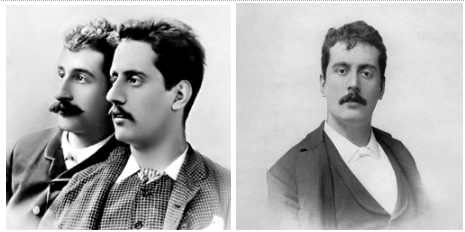 1. Ferdinando Fontana and Giacomo Puccini,(1885) / Puccini Museum 2. Puccini (1880-1889) / Puccini Museum
1. Ferdinando Fontana and Giacomo Puccini,(1885) / Puccini Museum 2. Puccini (1880-1889) / Puccini Museum
Although they lost the competition, a group of friends, led by Arrigo Boito, the librettist for Verdi's Otello (1887) and Falstaff (1893), subsidized its production and its premiere at Teatro dal Verme on May 31, 1884.
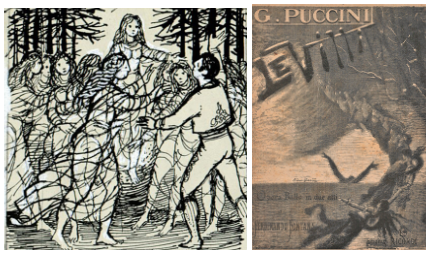
1. Drawing for Le Villi (undated) / Ricordi Archive 2. First La Villi Program / Ricordi Archive
Puccini sent his mother a telegram on the night of the premiere: "Theatre packed, immense success; anticipations exceeded; eighteen calls; finale of first act encored thrice." Two months later, Albina Magi Puccini succumbed to cancer and died before Puccini could return to her side.
Puccini's triumph with Le Villi, his first major success, was shadowed by his mother's death. The loss left a void that would be felt in his work to come. In his grief, Puccini wrote: "I think of her continually… Whatever triumph art may bring me, I shall never be truly happy without my darling mother." This unresolved sorrow later emerges in La Bohème, where the tenderness and fragility of Mimì echoes Albina's warmth.
After his mother's death, Puccini's life was marked by a constant search for connection. He soon started a passionate and controversial affair with Elvira Gemignani, his married piano student. Their affair sparked gossip and scandal in their conservative society, yet Elvira remained pivotal in Puccini's life, inspiring characters such as Musetta—vivacious, empathetic, and quick-witted.
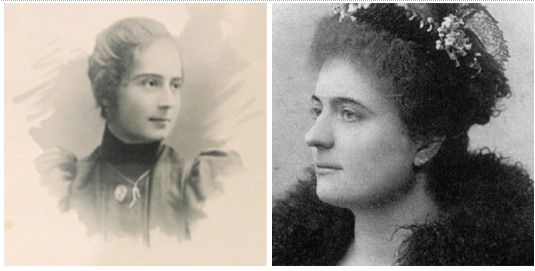 1. Elvira Gemignani / Puccini Museum 2. Elvira Gemignani (1886) / londonfestivalopera.co.uk
1. Elvira Gemignani / Puccini Museum 2. Elvira Gemignani (1886) / londonfestivalopera.co.uk
But even Elvira's fierce presence could not erase the wound left by Albina's passing; it left a broken soul and a severed financial lifeline. Letters from this time show a man who felt lost: "The world feels colder without her voice," he wrote. Mimì's tragic death reflects the deep grief that troubled Puccini. Her death scene isn't just part of the story; it's a powerful expression of his lingering sadness, a musical tribute to a mother's love and devotion that was taken away too soon. "Each note is a whisper, each melody a memory," Puccini told a friend.
La Bohème: A Requiem for a Mother and a Nation
The circumstances that set the stage for La Bohème are the same that gripped tenements in Milan, where families huddled together against hunger and hopelessness. Beyond the intimate tragedy of La Bohème is a broader story of social upheaval. Italy in the late 19th century was a land of strikes, riots, and rising socialist movements. In the industrial cities, workers clashed with authorities, while the marginalized remained trapped in feudal poverty. Although Puccini never openly embraced socialism, many of his friends and collaborators did so. His art spoke to their struggles. La Bohème may portray the lives of bohemian artists, but its world is one of harsh realities, cold garrets, hunger, and fleeting dreams. It is a quiet reflection of the suffering and disillusionment that plagued Italy.
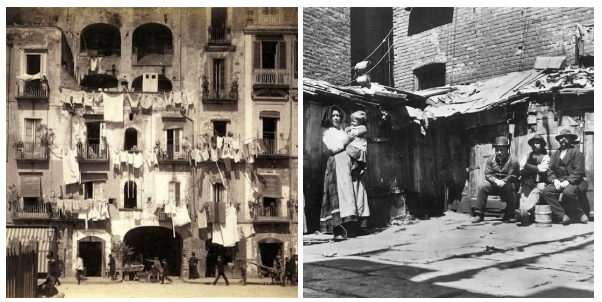 1. Tenement Slums, Italy (1878) / Giorgio Sommer 2. Tenement Slums, Italy (1880’s) / Jacob RiisBettman Archive Getty
1. Tenement Slums, Italy (1878) / Giorgio Sommer 2. Tenement Slums, Italy (1880’s) / Jacob RiisBettman Archive Getty
Critics of Puccini's time dismissed La Bohème as a sentimental, even regressive, love story in the age of revolution. However, Puccini understood that beneath the grand ideals of change lies individual suffering, forgotten dreams, and quiet acts of kindness. What critics saw as sentimentality was, in truth, radical empathy, an ability to transform personal grief into universal beauty.
For Puccini, La Bohème was a tapestry of his own life: his mother's unwavering love, the despair of a struggling nation, the irresistibility of a vivacious woman, and the artists that created to find a human connection. Puccini wrote to his librettist Luigi Illica in 1912, “I want to make people weep: therein lies everything…Love and grief were born with the world…We must therefore find a story which holds us with its poetry and its love and its grief and inspires us to the point that we might make an opera of it.”
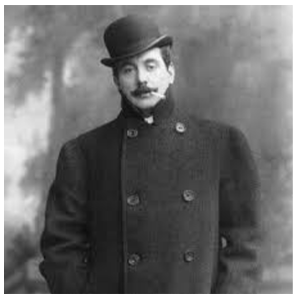 Giacomo Puccini (1880-89) / A. Dupont/Library of Congress, Prints and Photographs Division
Giacomo Puccini (1880-89) / A. Dupont/Library of Congress, Prints and Photographs Division
As the critic Harvey Sachs once noted, "Puccini's genius lies in his ability to transmute personal pain into universal resonance."
Puccini created the quiet truth that beauty, even born of suffering, endures.

